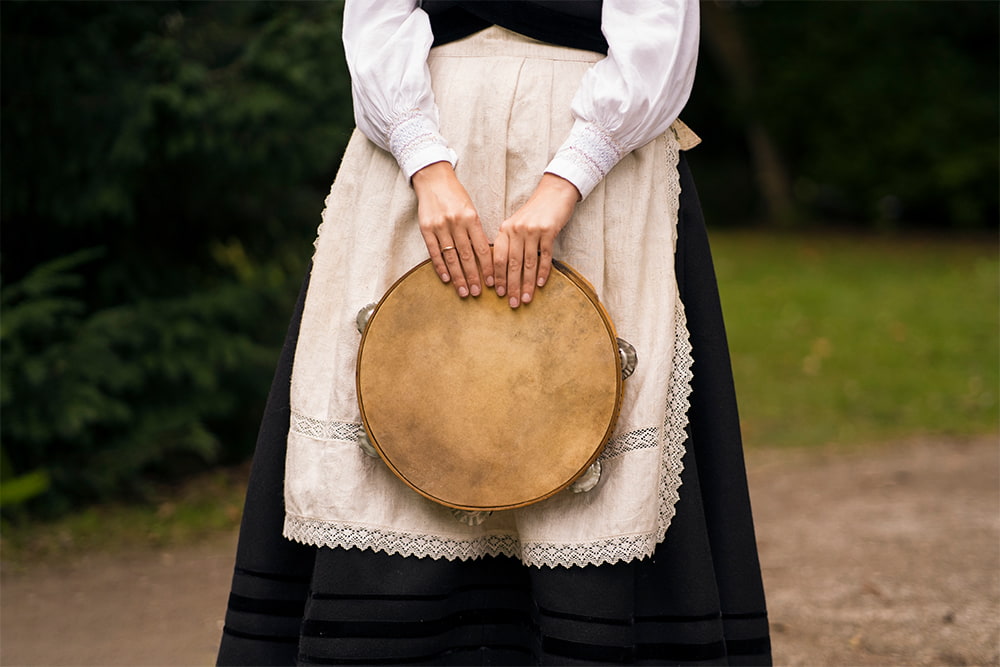On May 17, 2025, Galicia will celebrate the ‘Día das Letras Galegas’ with a special tribute to popular oral poetry and to the women who, over generations, have been its main guardians and transmitters: the cantareiras.
The Royal Galician Academy has decided to dedicate this day to some of the most representative figures of the Galician oral tradition: Adolfina and Rosa Casás Rama, from Cerceda; Eva Castiñeira Santos, from Muxía; and the sisters Prudencia and Asunción Garrido Ameixenda, together with Manuela Lema Villar, known as the Pandeireteiras de Mens.
A centuries-old tradition
Music and poetry have always gone hand in hand in Galicia. The figures of the cantareiras and pandeireteiras were born in a context of collective work, where neighbors and farmers helped each other. After days of labor, they celebrated with music and dance, creating a space in which songs were transmitted that told the story of rural life and the customs of the community.
These six women represent all those who, with their dedication, have kept this centuries-old tradition alive, leaving a legacy that continues to influence new generations.
Although the popularity of the piper and drummer overshadowed their figure, these women played an essential role in the creation and dissemination of popular songs.
Adolfina and Rosa Casás Rama, guardians of tradition in Cerceda
Adolfina (1913-2005) and Rosa Casás Rama (1912-2009), aunt and niece from Cerceda, represent the essence of the Galician musical tradition in the province of A Coruña. Raised in Vila da Igrexa, both were renowned cantareiras and pandeireteiras. Their variety of melodies, the originality of their coplas and their capacity for improvisation stand out.
Eva Castiñeira, the voice of Muxía that crossed frontiers
Eva Castiñeira (1926-2010), originally from Muxía, began singing at the age of eight. After moving to A Coruña in her youth, her talent was discovered by members of the record label Ruada. In 1981, she performed with the folk group Milladoiro, becoming one of the first pandeireteiras to join modern groups.
The Pandeireteiras de Mens, ambassadors of Malpensa’s traditions
Three of the five Pandeireteiras de Mens, originally from Malpica de Bergantiños, are Prudencia Garrido Ameixenda (1905-1993), Asunción Garrido Ameixenda (1915-2007) and Manuela Lema Villar (1913-1993). These women, also known as “As Vellas de Mens”, began performing in the 1970s, taking their music to Galicia, Spain and America. Their participation with the Agrupación Folclórica Aturuxo allowed them to share their art and preserve traditional songs that reflected the life and customs of their community.
Recognizing women as pillars of Galician culture
The choice to focus the celebration on cantareiras and pandeireteiras underscores the essential role of women in the preservation and transmission of Galician culture. These artists, who often worked in the shadows, were instrumental in keeping alive the musical and poetic traditions that today define Galicia’s cultural identity. Their legacy continues to inspire contemporary musicians and artists who fuse traditional rhythms with modern sounds, demonstrating the richness of Galician popular music.
This Día das Letras Galegas will be an opportunity to reflect on the importance of the oral tradition and to recognize the work of the women who have ensured its transmission over the years.
By paying tribute to the cantareiras and pandeireteiras, Galicia reiterates its commitment to the preservation of its cultural heritage and language, ensuring that future generations will continue to value and enrich this legacy.






0 Comments